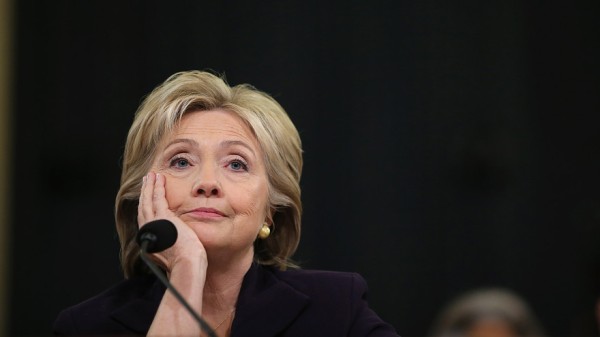Trump simply isn’t concerned with the truth of anything he says. He’ll elude the media until they understand that

Credit: AP/John Lochner
The reality of Donald Trump’s months-long dominance of the GOP primary race has suddenly started sinking in with political elites, as has a new willingness to openly talk about his pervasive lying.
After that, the willingness to start using the word “fascism” was not far behind. The phenomena are related, of course. GOP politics have been based on lies and authoritarianism since at least the time of Richard Nixon. But now it’s happening in a new key, in a higher register. The old system for managing the lies, manipulating their salience, directing and redirecting the anger and adoration they arose, that system has broken down badly in the last several years, and it now seems to have broken down irreparably.
Nate Silver makes a crucial point, however, tweeting, “One can coherently argue that Trump isn’t ‘lying’ so much as bullshitting, in the H.G. Frankfurt sense of the term.” Frankfurt’s book “On Bullshit” argues that bullshitting is a more radical attack on truth than lying is:
[B]ullshitters seek to convey a certain impression of themselves without being concerned about whether anything at all is true. They quietly change the rules governing their end of the conversation so that claims about truth and falsity are irrelevant.
Bullshitting is anything but new to politics, of course. So the question really is: how is Trump’s bullshitting different? Although David Roberts doesn’t use the term “bullshit”, he does keenly see the problem in similar terms. The establishment media “don’t mind being properly lied to; it’s all part of the game,” Roberts writes. “What they cannot countenance is being rendered irrelevant. Trump is not kissing the ring.” Trump’s contempt for the media is all part of the proto-fascist package, of course, as well as being the natural outgrowth of decades of media-bashing.
More on Roberts in a moment, but first a nod to what the alternative might be. Jay Rosen has a sharp analysis of how this breakdown in gatekeeping function reflects institutional problems connected to a vapid notion of objectivity, which he’s elsewhere critiqued as “the view from nowhere,” a term he’s been using since 2003. If asked “What’s your agenda in covering the campaign?” they would all reply, “No agenda, just solid coverage.” But the one journalist who’s perhaps done the best job of accurately portraying Trump, Univision’s Jorge Ramos, clearly has an agenda — representing his audience’s intense concern for comprehensive immigration reform — and yet, Rosen notes, that doesn’t prevent him from accurate, incisive reporting; in fact, it helps guide him in that reporting, which has pressured politicians of both parties:
The example of Ramos shows that knowing what you’re for doesn’t have to mean joining the team or taking a party line. It’s possible to maintain your independence, win trust with your audience, and gain a clear sense of purpose when you’re out on the campaign trail. But you have to break with the pack.
Of course, every news organization can’t be Univision, but there other ways to find a different agenda, one that actually connects with what people care about. Rosen links back to 2010 proposal he made for a citizen’s agenda approach, one that would start by asking the public, “What do you want the candidates to be discussing as they compete for votes in this year’s election?” and use that as the foundation to build on. Another approach could be built based on public interest polling of the sort developed by Alan Kay in the 1980s, which I wrote about in October. Alternatives exist. And they provide ways to reconnect media with the broader public they’re supposed to serve. But it takes real courage to pursue them.
That said, let’s return to the question of how things suddenly got so much worse this cycle with Trump. As Roberts points out, GOP truthiness long predated Trump, but the media’s power to restrain it has eroded precipitously. He notes that the right has long been working hard to erode the media’s critical power, with constant accusations of bias to stifle critical media judgments on the one hand, while on the other hand developing “a network of partisan think tanks, advocacy organizations and media outlets that provide a kind of full-spectrum alternative to the mainstream.”
The result, Roberts says, “has been a kind of fragile detente. A certain style of lying has become more or less acceptable, as long as it follows unspoken rules,” rules which Donald Trump is now breaking. Or, to rephrase it in Frankfurt’s terms, one framework of bullshit is being challenged by another. Roberts identifies three rules of lying that Trump has broken:
“1.) Lies about policy are fine; lies about trivial, personal or easily verifiable claims are not.” Trump, however, tells both kinds of lies with impunity.
“2.) Lies are fine as long as an ‘other side’ is provided.” But Trump doesn’t bother with this at all. “He rarely mentions studies or experts, other than occasionally name-dropping Carl Icahn. He rarely mounts anything that could even be characterized as an argument. He simply asserts.” Which leaves journalists fresh out of fig leaves. “He calls their bluff, forcing them to be with him or against him,” which clearly they can’t do using what Rosen calls the “view from nowhere” model they’ve lived within for so long.
“3.) Nine lies are fine as long as the tenth is retracted.” Call it the face-saving rule. In contrast to the constant flood of lies, “when a politician goes overboard and makes an obviously, verifiably false claim about a matter of recorded fact, the media will browbeat him or her into retracting it and apologizing.” It lets the press feel relevant, even powerful. “But Trump does not back down, retract or apologize, ever, not even for the most trivial thing. He refuses to allow journalists and pundits to validate their watchdog role.”
Roberts goes on to make additional significant points — that Trump is basically an opportunist beneficiary, “taking advantage of a faction of the electorate that has been primed to respond to someone like him,” over a period of decades, and that “the social and demographic trends driving the Trump phenomenon are far deeper than Trump himself. They will outlast him.” All that is true, and more. Both Roberts and Rosen deserve to be read and re-read in full.
But I believe that this list of ways that Trump breaks the rules is only a first approximation, primarily because it presents an even-handedness that never actually existed. For example, most of Bill Clinton’s presidency was plagued by ongoing rightwing conspiracist obsessions which filtered into the mainstream media. Most of the really wacky stuff (like the “Clinton body count”) never got through to the likes of the New York Times and the Washington Post, but those two bastions of the “liberal media” did carry the torch for the Whitewater investigation, as Gene Lyons documented in Fools for Scandal: How The Media Invented Whitewater. They were instrumental in keeping the investigation alive, most notably by burying the results of the Pillsbury Report, commissioned by the Resolution Trust Corporation, which found the Clintons innocent of any wrongdoing in 1995.
So it’s not really true that the media polices “lies about trivial, personal or easily verifiable claims” whether on the left or the right. Indeed, the explosive growth of conspiracies in the 1990s helped to erode the distinction between such lies and lies about policy. Conspiracy narratives question, reinterpret or outright fabricate facts on the one hand and policies on the other. One hallmark of conspiracist thinking is its self-sealing nature: any evidence that appears to refute it is actually just evidence of an even-deeper conspiracy. The conservative embrace of global warming denialism is a major example of how such thinking has thrown the mainstream media into a semi-permanent state of disarray.
Still, the list Roberts offers is a decent first approximation. If not an iron law, it points to strengths and weaknesses of how the media has generally dealt with lies up till now. What’s more, it helps illuminate the way that Sarah Palin helped set the stage for Trump. In a broader sense, as David Neiwert touched on recently, Palin was a significant figure in the virulent growth of rightwing populism which Trump embodies today, and which is bringing dangerously close to outright fascism.
Perpetuating “lies about trivial, personal or easily verifiable claims” is hardly the worst or most central thing about a movement tending towards fascism, but it is an inescapable ingredient. The sense of grievance is a root sentiment such movements thrive on, and figures like Palin and Trump are master grievance collectors, who never let inconvenient facts stand in their ways: They simply invent new ones to serve their needs. Trump’s breaking of the second lie gets closer to the heart of the fascist direction he’s taking us in: the overthrow of all existing institutions, sweeping them aside as forms of weakness and disease.
With these thoughts in mind, we can look back at a scandal plaguing Sarah Palin as she stepped onto the national stage, and see it in a very different light — the Troopergate scandal. It concerned her abuse of office in pursing a vendetta against her former brother-in-law, Mike Wooten, attempting to get him fired as state trooper and letting her husband run wild in the process.
There were two more deeply troubling stories about Palin that the press overlooked at the time. The first concerned her long history of involvement with secessionists in the Alaska Indepenence Party, an excellent account of which appeared here in Salon, by David Neiwert and Max Blumenthal. It’s certainly hard to square Palin’s self-identification as a “real American” with years of palling around with folks who want nothing more than to leave America forever, but that’s exactly what Palin did. The second concerned her life-long association with an extremist religious cult movement, known as the Third Wave movement, or the New Apostolic Reformation. It’s part of a wider dominionist movement which seeks to take “dominion” over secular society and government in the U.S. and throughout the world. The mainstream media wouldn’t touch reporting on Palin’s NAR involvement; for that you had to rely on researchers like Bruce Wilson and Rachel Tabachnick at Talk2Action.org.
Written by PAUL ROSENBERG via SALON




